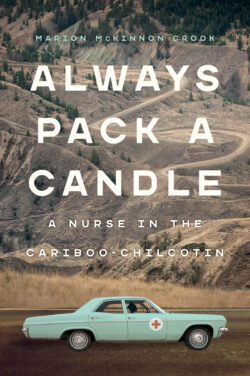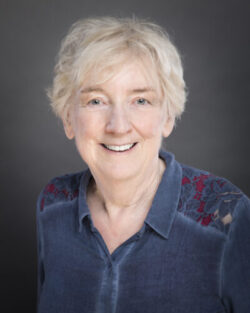1165 Cariboo truth and invention
Always Pack a Candle: A Nurse in the Cariboo-Chilcotin
by Marion McKinnon Crook
Victoria: Heritage House, 2021
$22.95 / 9781772033625
Reviewed by Phyllis Reeve
*
 Delivering healthcare throughout the geographical vastness of B.C. would seem impossible — and yet health professionals and, yes, governments, have been doing just that for generations, since 1869 with the passage of an ordinance for promoting public health in the colony.
Delivering healthcare throughout the geographical vastness of B.C. would seem impossible — and yet health professionals and, yes, governments, have been doing just that for generations, since 1869 with the passage of an ordinance for promoting public health in the colony.
When newly minted nurse Marion McKinnon arrived in Williams Lake in 1963, she was not entering completely uncharted territory. But the charts did lead her along some hazardous roads. In the government’s 1962 Chevy II, she drove over logging roads on the edge of precipices to reach remote communities in need of well-baby clinics, tuberculosis testing and contact tracing, family planning, protection, information, suggestions, and immunizations, including the new spoon-administered polio vaccine. She was advised to always pack a candle, in case she and the Chevy were stranded far from help, in the dead of winter.
She knew she was strong on theory and short on experience, learning on the go and assuming authority when necessary. Almost immediately she encountered tragedy when a young man died in a tree-felling accident. Her vignettes of interaction with her patients keep the reader turning the pages. This seems real. Her life is far from a matter of all work and no play; there are community events and dances and stampedes and picnics. There are other young people, including the teacher with whom she shares an apartment, as well as doctors and cowboys and loggers. There is romance with a rancher whose cowboy boots and Stetson “went well with his green eyes and ash-brown hair.” There are moments where she takes time to breathe, appreciate the landscape, and share that appreciation with us.


So this book is a good read. But it has a problem. Two pages into Chapter One, I was jolted by this bit of personal history:
At fifteen, I’d written to Canada’s only veterinary college and asked what high school courses I needed for entry. I wanted a career with animals and one that let me live outdoors as much as possible. I remembered their answer: ‘Don’t bother to apply. We don’t take women.’
Marion Crook is three years younger than I am. My best schoolgirl friend graduated from Ontario Veterinary College in 1963, 40 years after the college accepted its first woman student, and the year nurse Marion arrived in the Cariboo.
Marion Crook’s little anecdote is not only wrong, it is unnecessary, and I can’t figure out why she wrote it. It is not the only puzzle. She could have considered a career in medicine — there were several women in my husband’s 1962 class at McGill — but she didn’t. UBC had been offering a degree course in nursing science since 1919, but she chose “an on-campus course in Seattle, rather than a hospital course in Vancouver, because it was the sciences I had wanted to pursue, not patient care.” She is entitled to her personal choices, but she does not make it easy to follow her logic. By the end of that page, I do not care much about her, but I do care about facts and about getting his/ herstory right, and giving credit where credit is due to Canadian institutions.
Crook makes the usual disclaimers about changing names and conflating times and events. That is routine and acceptable, but changing truth is something else. There is not much point in this type of book if we can’t trust the impersonal background facts. Even the admitted enhancements raise questions. Sam, who marries her roommate and introduces her to the green-eyed rancher, is an “invented character.” Does that mean all those jolly double dates and conversations are also invented? I suppose it is a relief to know that the rancher himself is “based on a real person.”
Then there is her tendency to tout her university degree and her plans for post-graduate work, at its least pleasant when she mocks a fellow nurse, Sophie, who was only a “hospital trained” RN, not a college graduate, and whose attempts to improve her vocabulary were by definition doomed to produce hilarious results. The interesting note here is that when Marion corrects her at a time when the right word really matters, the other nurse thanks her with obvious sincerity. Maybe the hapless RN and her blunders are meant to be comic relief. I hope she is one of the invented characters.
It is too bad about these problems, because a memoir by “a nurse in the Cariboo-Chilcotin” would be worth reading. Marion McKinnon Crook does tell a good story, and she has written numerous books of fact and fiction; it’s just that in this instance she seems to have forgotten which is which.
*

Phyllis Parham Reeve writes about local and personal history in her three solo books and in contributions to journals and multi-author publications. She is a contributing editor of the Dorchester Review and her writing appears occasionally in Amphora, the journal of the Alcuin Society. She co-founded the bookstore at Page’s Resort & Marina on Gabriola Island. More details than necessary may be found on her website. Editor’s note: Phyllis Reeve has also reviewed books by Daphne Marlatt, Ayesha Chaudhry, Sylvia Olsen, P.K. Page, Peggy Lynn Kelly & Carole Gerson, Iain Lawrence, Michael Kluckner, Jack Lohman, Mona Fertig, and Ken Lum, among others.
*
Marion Crook responds as follows:
I don’t usually respond to reviews because I believe reviewers have a right to express their opinion without any input from the author, but in this case I am disturbed by an accusation that I’m not telling the truth, so I’m responding to the following points.
The reviewer maintains that I say women were not accepted into veterinarian college in Canada and she knows some women did graduate. In response to my inquiry about what courses to take in high school to prepare for veterinary medicine, I received a letter from the veterinary college at Guelph, Ontario, Canada’s only vet college at the time, telling me that I need not apply because I was a woman. They said also in that letter that they occasionally took a woman if she was married to a veterinarian. I assumed they occasionally allowed a woman to study there, but it wasn’t going to be me. They may have had a different policy before my time and, certainly, they changed their policy after, but at the time I inquired, the response was — don’t apply because we won’t accept an application from a woman. That letter from the veterinary college, shocking as it was, was my lived experience.
The second point the reviewer took from my discussion of career choices was that I didn’t think there was a Bachelor of Science in Nursing at UBC. Indeed, there was a program at UBC. However it was not a straight four-year program. It was one year of university, then two years in the hospital, then two years at UBC. At least that was how I understood it at the time. I didn’t want that program. I wanted a four-year baccalaureate.
I am very sorry I didn’t make it clear how much I cared for Sophie. She was intelligent, always wanting to learn, innovative in the way she solved problems and full of humour. She made me laugh even at myself. We were friends for years and I loved her.
The book was written from my point of view. I tell the reader what I saw, thought, felt and did. — Ed.
*
The Ormsby Review. More Books. More Reviews. More Often.
Publisher and Editor: Richard Mackie
The Ormsby Review is a journal service for in-depth coverage of B.C. books and authors. The Advisory Board consists of Jean Barman, Wade Davis, Robin Fisher, Cole Harris, Hugh Johnston, Patricia Roy, Maria Tippett, and Graeme Wynn. Scholarly Patron: SFU Graduate Liberal Studies. Honorary Patron: Yosef Wosk. Provincial Government Patron since September 2018: Creative BC
“Only connect.” – E.M. Forster
7 comments on “1165 Cariboo truth and invention”
I too wonder if Marion married Carl. Why was this not revealed? Is there to be a sequel? Regardless, I loved the book and I couldn’t put it down. I live in B.C. so the story really intrigued me. I also worked in the 60’s when opportunities for women in business were few. It felt like we had two career choices… nurse or teacher.
I just finished reading “Always Pack a Candle” and absolutely loved it. It was recommended to me by a friend who had also enjoyed it. I keep wondering if Marion ended up marrying Carl, the handsome cowboy gentleman. Thank you for writing such a great story.
Loved loved “Always Pack A Candle” and I really wanted your life’s story to go on. For instance did you end up marrying the rancher you called Carl, and why was only one of your children Indigenous. I guess I’m being a bit cheeky asking you this but I am also 81 and a bit more daring nowadays 😂